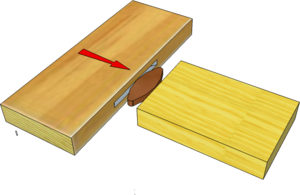Biscuit Joint: Difference between revisions
From DT Online
(Created article) |
mNo edit summary |
||
| Line 3: | Line 3: | ||
The compressed '''[[Jointing Biscuit|Biscuits]]''' are quite loose in the '''Slots''' or '''Grooves''' when first assembled but swell to become a tight fit when the glue wets them. This makes the joints easy to assemble but requires them to remain in '''[[Sash Cramp|Cramps]]''' when glued. | The compressed '''[[Jointing Biscuit|Biscuits]]''' are quite loose in the '''Slots''' or '''Grooves''' when first assembled but swell to become a tight fit when the glue wets them. This makes the joints easy to assemble but requires them to remain longer in '''[[Sash Cramp|Cramps]]''' when glued. | ||
Revision as of 12:02, 5 February 2016
A Biscuit Joint is a type of reinforced Butt Joint made by inserting dried and compressed wooden Biscuits into pre-cut slots or Grooves. The joining system was developed in the 1950's by a Swiss carpenter (Hermann Steiner) as a means of joining together Chipboard.
The compressed Biscuits are quite loose in the Slots or Grooves when first assembled but swell to become a tight fit when the glue wets them. This makes the joints easy to assemble but requires them to remain longer in Cramps when glued.
Biscuit Joints are often used to strengthen a Widening Joint but can be used in many joint configurations. The Biscuits can be fitted in to the crescent shaped slots machined specifically for the task by a Biscuit Jointer, into a similar shaped slot machined by a Router fitted with a Slot Cutter or simply set alongside each other in a continuous through Groove.

